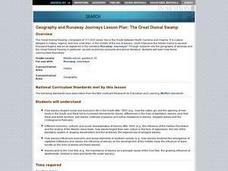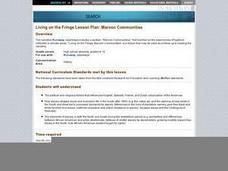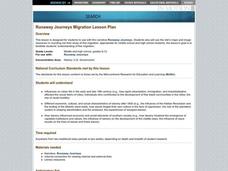Curated OER
The Gullah People of the Sea Islands
Eighth graders examine the lives of the Gullah-Geechee people. In this unique cultures lesson plan, 8th graders explore music, language, and slavery of the Gullah-Geechee people from the southern low-country in the United States....
Curated OER
Literature for Lesson 2 - The UnderGround Railroad
Students examine the use of the Underground Railroad. In this Underground Railroad lesson, students determine the meaning of the word slavery. They study the Underground Railroad through the use of literature and Internet websites. They...
Curated OER
Slavery in the United States
Students research slavery in the United States and present their findings as a newscast with appropriate visuals to the class.
Curated OER
Slavery in America at the Time of the Civil War
Eighth graders create simple html pages as a vehicle for presenting the Inspiration web. In this American History lesson plan, 8th graders research slavery in the United States.
Curated OER
Background to the Conflict: Pre-Civil War Days
The American Civil War was a complex test of a relatively young democracy in the mid-nineteenth century. Discuss the events and factors that led to the Civil War with a thorough slideshow presentation.
EngageNY
Grade 9 ELA Module 4, Unit 1, Lesson 7
Class members examine the images Arson and Budhos use to depict the working conditions on the sugar plantations and consider how these images support the arguments the writers present in Sugar Changed the World.
EngageNY
Grade 9 ELA Module 4, Unit 1, Lesson 20
After comparing the working conditions of the enslaved people to those of the Indian indentured workers on the sugar plantations, class members examine the conditions and the actions of specific historical figures that Marc Aronson and...
EngageNY
Grade 9 ELA Module 4, Unit 1, Lesson 21
Class members read the chapter, "Serfs and Sweetness" from Sugar Changed the World, and identify the central idea that the development of beet sugar and modern farming technology changed the reliance on the plantation system and made...
Curated OER
Eighteenth-Century Slave Codes
Students explore slavery by reviewing the written laws intended to keep African Americans subservient. In this U.S. slavery lesson, students analyze a time-line of the history of African Americans. Students discuss the patterns of the...
Curated OER
Whitewashing Southern History
Students discuss the fact and fiction of slavery in the South. After viewing a video on two New Orleans plantations, they determine the accuracy of the facts presented. In the computer lab, they visit various sites and examine which ones...
Curated OER
Fugitive Slave Narratives
Students analyze the ways slavery shaped social and economic life in the South after 1800, the different economic, cultural, and social characteristics of slavery after 1800, and the ending of the Atlantic slave trade.
Curated OER
THE GREAT DISMAL SWAMP
Learners analyze how slavery shaped social and economic life in the South after 1800, the different economic, cultural, and social characteristics of slavery after 1800, and slavery both prior and after the Civil War.
Curated OER
From Slaves to Soldiers: African Americans in the Civil War
Tenth graders observe several films, including The Divided Union, focusing on the conditions of slavery and African American soldiers in the Union Army. In addition, they watch Uncle Tom's Cabin and Glory to reinforce their knowledge of...
Curated OER
African American Life in the Pee Dee Before the Civil War
Third graders examine the life of the African American in the Pee Dee region during slavery. In this slavery lesson, 3rd graders explore primary and secondary documents related to the topic and create a timeline of when slavery first...
Curated OER
Maroon Communities
Students examine political and religious factors that influenced English, Spanish, French, and Dutch colonization of the Americas, how slavery shaped social and economic life in the South after 1800, and elements of slavery during the...
Curated OER
A Day at Mount Vernon
Students discover daily life on George Washington's plantation, Mount Vernon. In this compare and contrast lesson, students examine the life styles at four distinct sites at Mount Vernon to become familiar with the people, places, and...
Curated OER
RUNAWAY JOURNEYS MIGRATION
Students analyze the influences on urban life in the early and late 19th century, different economic, cultural, and social characteristics of slavery after 1800, the rise of racial hostility, and the ending of the Atlantic slave trade.
Curated OER
The Great Slave Debate
In this slavery debate worksheet, students read the quotes in the bubbles and write them down according to the side, North or South, they correspond with.
Curated OER
Go Down Moses
Fifth graders investigate the workings of the Underground Railroad. In this slavery lesson, 5th graders read personal accounts from slaves, examine secret codes of the Underground Railroad, and play a board game based on the trip many...
Curated OER
They're Only Children
Third graders compare how the lives of African American slave children differed from children's lives today. For this analysis of slavery lesson, 3rd graders evaluate and discuss the conditions of slavery in collaborative groups. Using...
Curated OER
The Emancipation Proclamation
Middle schoolers read one of the most important documents in our nation's history: The Emancipation Proclamation of 1863. After everyone reads the proclamation, they set out to write a "You Were There" type of report on it. They pretend...
Curated OER
Families in Bondage
Students examine actual letters writen by slaves and write essays based on these letters describing what it might have been like for an African American family living in the South during that time period.
Curated OER
Whitewashing the History of the South
Learners research online a variety of different plantation museums across the South to ascertain how realistically, if at all, slavery is portrayed. This is a very interesting way for students to see how history can be presented in many...
National Endowment for the Humanities
“Twelve Years a Slave”: Analyzing Slave Narratives
Readers of Solomon Northup's brutally frank slave narrative Twelve Years a Slave examine passages that support the argument that slavery "undermined and corrupted" the institution of marriage. Background information is provided by a...

























